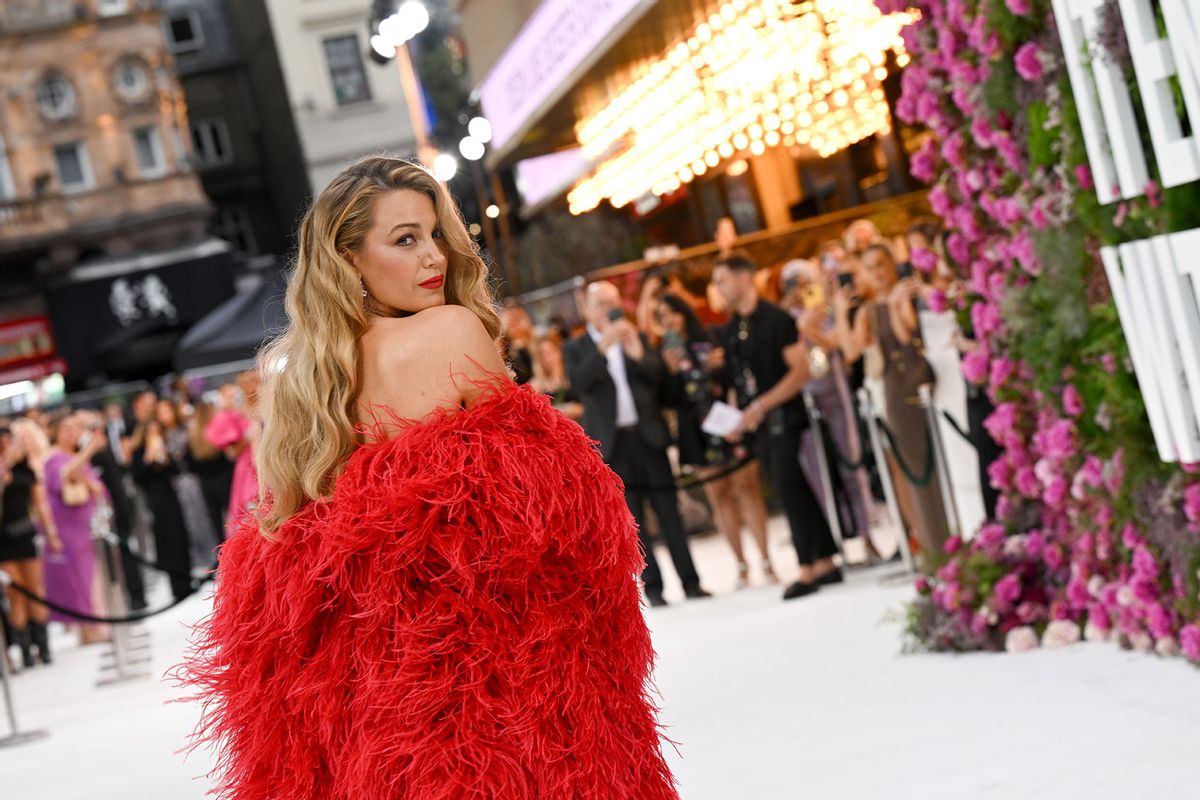The internet can't stop talking about Blake Lively — and no, it's not because of her attention-grabbing "It Ends With Us" outfits she's been wearing while doing press. Instead, buzz and speculation are surrounding the behind-the-scenes relationship between Lively and her co-star and "It Ends With Us" director Justin Baldoni.
Whispers about the potential fraying of their working relationship began earlier this week as press for "It Ends With Us" ramped up ahead of the movie's release on Friday. It began on Aug. 6 during the movie's premiere when they didn't take photos together on the red carpet – which is expected of leading costars – and instead took photos separately with their friends and spouses, which included Lively's husband Ryan Reynolds, his "Deadpool & Wolverine" co-star Hugh Jackman. Fans also noticed that Lively, Reynolds, Hoover and the rest of the cast do not follow Baldoni on Instagram, even though he does follow them.
All this mystery reminds audiences of the fraught press tour surrounding Olivia Wilde's "Don't Worry Darling" where every new interview played out like a scene straight from the psychological thriller. During Venice Film Festival, audiences agonized over what Florence Pugh would say, do or wear next or if Harry Styles really spit on Chris Pine.
When it comes to "It Ends With Us" though, there are no clear answers to the internet's burning questions. But maybe that's for the best because this controversy is actually distracting from the real issue with the story: its controversial handling of domestic abuse and the lack of discourse around the polarizing subject matter.
The film is based on Colleen Hoover’s novel "It Ends With Us," which was released in 2016 and hit No. 1 on The New York Times paperback list in 2022, selling more than four million copies. It's also topped numerous other book lists and filled BookTok with creators raving about its romance.
"It Ends With Us" is about a florist, Lily (Lively) who falls in love with a neurosurgeon, Ryle (Baldoni) who turns out to be abusive. Both the book and movie, which are based on Hoover's parents' relationship, play out through Lily, who struggles to see herself as a victim of an abusive relationship and ultimately chooses to stay with Ryle and marry him. It's not until after she finds out she is pregnant with their child that she decides to leave him. Hoover's book has been criticized for romanticizing a relationship that is marked by domestic violence, and the film adaptation didn't necessarily improve on that impression.
The Associated Press critic Mark Kennedy wrote in his review, “The uneven movie adaptation of Colleen Hoover’s best-selling 2016 novel . . . tries to balance the realities of domestic violence inside a rom-com and a female-empowerment movie. All suffer in the process."
TIME critic Stephanie Zacharek wrote, "The movie is accurate and effective in this sense: for so many abused women, you never know how bad it can get, until it gets really bad. Yet none of that is enough to make you fully buy what the movie’s selling."
It seems that it's not the subject matter that is at fault – trying to call attention to the insidiousness of domestic violence – but rather its execution that misses the mark. This lack of awareness about how exactly to treat the heavy subject matter effectively can be seen in one of Hoover's most inappropriate decisions about her book.
It turns out that the author, seeking to capitalize on the popularity of her novel, had made plans to release an "It Ends With Us"-themed . . . coloring book. Yes, you read that right. A coloring book inspired by a domestic violence romance. After the backlash, Hoover publicly apologized and announced the plans for the coloring book were canceled.
The author posted on her social media, "The coloring book was developed with Lily’s strength in mind, but I can absolutely see how this was tone-deaf. I hear you guys and I agree with you. No excuses. No finger pointing. I have contacted the publisher to let them know I would prefer we don’t move forward with it. Thank you for the respectful discourse and accountability. Nothing but love."
We need your help to stay independent
It's evident that long before the controversy between Lively and Baldoni, the "It Ends With Us" problems were already present in the source material. The adaptation could have been a good way to reframe the story's central relationship and meaningfully delve into the topic. But instead, it appears that the movie has confused matters even more, offering a story that is light and fluffy like a romantic comedy while also tackling serious subject matter – creating a tonal dissonance.
Some speculate that the actors' supposed friction could be a sneaky way to create buzz for the film and get fans invested in a way that doesn't address the central issues. But that's not what we need. We need authentic conversations about the dangers of domestic violence and how we live in a culture that would rather dissect celebrity rifts than dig through to the core of why abuse makes audiences uncomfortable to discuss because it simply exists. And perhaps a better movie on the subject that isn't so easily overshadowed by celebrity beef.



Shares